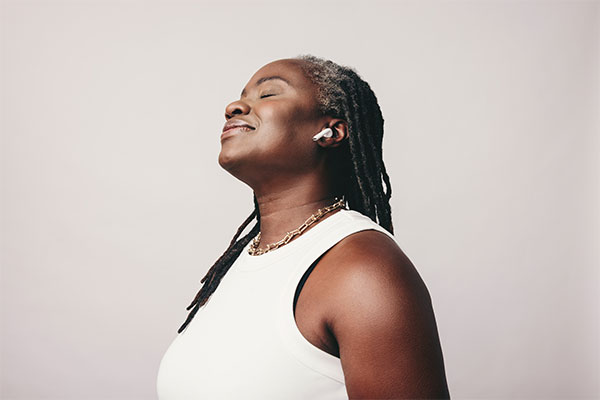Anxiety Support, Assessment and Treatment For Adults
Anxiety is a normal response and describes the unpleasant feeling we get when we are in a stressful, threatening or difficult situation. There are many types of anxiety and we all respond to anxiety differently.
Anxiety is only a problem when:
- It begins to negatively affect your daily life.
- Your anxiety is very strong.
- You are anxious most of the time.
- You can find no apparent reason for your anxiety.

How can we support you with anxiety?
As a rainbow is diverse, so will be your care with Rainbow Medical. Your assessment and treatment planning can occur in the same appointment, but, likewise, you may want more time. In collaboration with your Psychiatrist/Counsellor, you lead the service you receive. You can find out about our core values by clicking here.
Superficially, anxiety types can feel and look similar. Distinguishing one from another is part of a collaborative process of psychiatric assessment and treatment. One of the most common types of anxiety is Generalised anxiety disorder (GAD), which affects 1 in every 25 people in the UK.
Other anxiety disorders can include (this is not an exhaustive list):
- Obsessive-compulsive disorder (OCD)
- Post-traumatic stress disorder (PTSD)
- Substance-induced anxiety disorder
- Panic disorder
- Agoraphobia
Anxiety is a feeling of worry, nervousness, or unease. Generalised anxiety disorder (GAD) can be defined clinically by excessive anxiety and worry occurring on most days for more than six months. You may experience a range of mood and physical symptoms.
If you have Generalised anxiety disorder, you will:
- have lots of different worries at the same time
- have worries that are out of proportion to the situation
- find it difficult to control your worries.
In your mind:
- Feel worried all the time.
- Be unable to concentrate.
- Be irritable or depressed.
- Feel uneasy, overwhelmed or afraid.
In your body:
- Have a fast heartbeat.
- Sweating.
- Have muscle tension or pain.
- Experience headaches.
- Feeling faint.
- Suffer indigestion or cramps.
- Breathing fast.
When you first come to see us, you will have an assessment. Co-production enables our person-centred care; your assessment will be comprehensive, and, most importantly, collaborative.
One of our core values is to provide you with a personable and personal service; we believe in your ability to face, experience, and survive the unknown, and that your experience can help us improve our service.
After the assessment, a comprehensive treatment plan will be discussed, which may include medication, psychotherapy or both. This could be a separate appointment or part of your assessment.
Your Psychiatrist and your Counsellor will meet to discuss a personalised treatment plan that may, but not always, include medication. Because Co-production and person-centred care are our core values, we will discuss, with you, non-pharmacological treatment in combination with medication. Medication will only be discussed with your Consultant Psychiatrist, not a Counsellor. Other therapeutic approaches will also be discussed, which may include cognitive behavioural therapy (CBT).
You will always have time to consider all your options. A costed treatment package will be offered to you and you will have a two-week cooling off period. You can cancel a treatment plan at any time.
Whether you are receiving CBT from a Counsellor or meeting your Psychiatrist, we believe in your ability to face, experience, and survive the unknown, and that your experience improves your own care. We will conduct reviews of your treatment plan together, in collaboration.
We will always be frank: without openness and transparency, co-production cannot work.; trialling medication and getting the right dosage level (which is also known as titration) typically involves more than one appointment.

Psychiatrists like me sometimes need to remember that anxiety is real fear and fear has the potential to lead us down a path we don’t want to follow
Dr. Josep Vilanova
Consultant Psychiatrist
1: Meeting your Psychiatrist and Diagnoses
When you first come to see us, you will have an assessment. Co-production enables our person-centred care; your assessment will be comprehensive, and, most importantly, collaborative.
One of our core values is to provide you with a personable and personal service; we believe in your ability to face, experience, and survive the unknown, and that your experience can help us improve our service.
2: Collaborative Treatment Planning
After the assessment, a comprehensive treatment plan will be discussed, which may include medication, psychotherapy or both. This could be a separate appointment or part of your assessment.
Your Psychiatrist and your Counsellor will meet to discuss a personalised treatment plan that may, but not always, include medication. Because Co-production and person-centred care are our core values, we will discuss, with you, non-pharmacological treatment in combination with medication. Medication will only be discussed with your Consultant Psychiatrist, not a Counsellor. Other therapeutic approaches will also be discussed, which may include cognitive behavioural therapy (CBT).
You will always have time to consider all your options. A costed treatment package will be offered to you and you will have a two-week cooling off period. You can cancel a treatment plan at any time.
3: Aftercare support and starting your personalised treatment plan
Whether you are receiving CBT from a Counsellor or meeting your Psychiatrist, we believe in your ability to face, experience, and survive the unknown, and that your experience improves your own care. We will conduct reviews of your treatment plan together, in collaboration.
We will always be frank: without openness and transparency, co-production cannot work.; trialling medication and getting the right dosage level (which is also known as titration) typically involves more than one appointment.
A referral is not required initially. However, if a diagnosis of depression is likely, we will let you know when to request a GP referral.
The first meeting with your Psychiatrist and the Diagnoses takes approximately 1 hour.
Understanding anxiety is an important part of helping and being kinder to ourselves. We recommend you visit the Royal College of Psychiatrists website on anxiety by clicking here. The NHS and NICE also have comprehensive resources on understanding and treating anxiety.
The Royal College of Psychiatrists recommended resources:
Information and support on anxiety
- Anxiety and panic attacks, NHS – This section of the NHS website offers a broad range of information on anxiety.
- Every Mind Matters, information on anxiety – This information from the NHS offers tips to cope with anxiety as well as a free plan to help you deal with stress and anxiety.
- Anxiety UK, information on anxiety – This page from the charity Anxiety UK explains what anxiety is and has a video on practical tips for dealing with it.
- Mind, anxiety and panic attacks – This information from the mental health charity Mind looks at anxiety disorders in general, and includes information on Generalised anxiety disorder.
- Mental Health Foundation, Anxiety – This information from the Mental Health Foundation looks at anxiety and anxiety disorders.
Information and support on Generalised anxiety disorder
- Generalised anxiety disorder in adults information, NHS – This overview explains what GAD is and how to get help.
- Anxiety UK, information on Generalised Anxiety Disorder – The charity Anxiety UK offers information on GAD, as well as a free factsheet which you can download.
- Generalised anxiety disorder and panic disorder in adults: management – This information for the public from the National Institute for Health and Care Excellence (NICE) explains what care you can expect to receive if you have GAD.
You can expect to receive your psychiatric assessment/report in 4 days, from the date of your consultation with a consultant psychiatrist.
On average, all our patients have received their reports in two days.
Your report will include, where relevant:
- Your Background information and History
- A risk assessment
- The Diagnostic tools used and their results
- A Clinical impression
- Your diagnosis
- Clinical and Holistic treatment Recommendations
- A costed treatment plan which includes a two-week cooling-off period.
